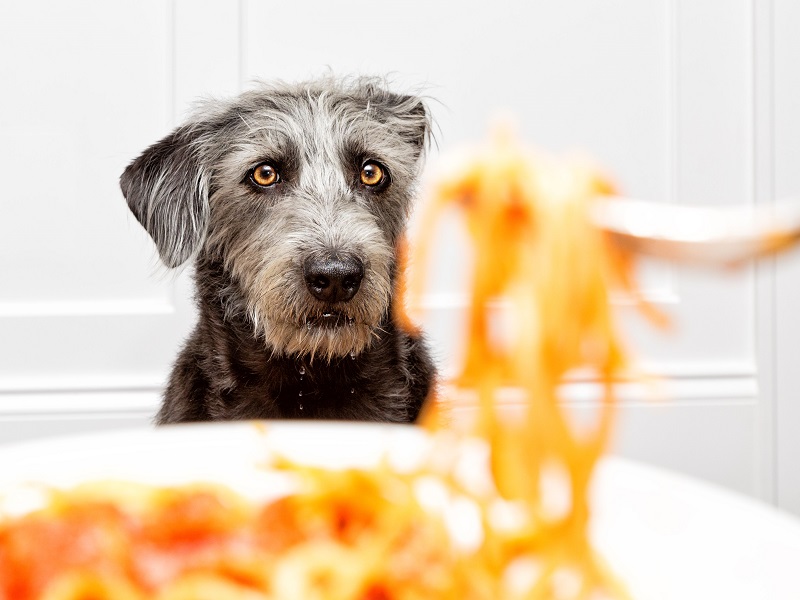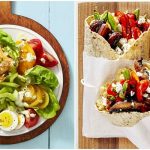
Pasta is one of the most common and typical dishes of our country and, often, as much as we love this food we tend to prepare too much … Right? If you have a four-legged friend at home, for sure at least once you have thought “pasta is bad for dogs, or can I give it to them?”. The temptation to offer your dog a plate of pasta with sauce, in white, or with pesto, for example, is great. Also because he will certainly appreciate this unexpected meal.
Is pasta bad for dogs?
We want to make it clear from the beginning that this food is not bad for dogs. So dogs can eat pasta without problems in most cases. However, in order to give it to him without risk, you have to pay attention to some details. Pasta is made from flour, water and, in some cases, eggs and as we all know it is an important source of carbohydrates.
The dog’s diet, however, must consist mainly of animal proteins and not carbohydrates. Let’s not forget that the dog in the wild would be carnivorous and it is only with the evolution. And the years of domestication passed together with humans that it has become practically omnivorous. It is precisely this aspect that deceives many owners who, therefore, decide to give leftover pasta to the dog.
You may also like to read, can cats eat yogurt. To know more visit our Blog http://equalityalabama.org/.
The dog can eat pasta but only occasionally and only if this food is mixed with meat to ensure the correct intake of proteins in its diet. Since that guaranteed by the pasta is not sufficient for the dog which, therefore, could suffer from nutritional deficiencies. . Be careful not to mix the pasta and industrial food because they undergo different digestive processes which, moreover, occur at different times and this can lead to intestinal or digestive problems.
Is rice bad for dogs?
If you’re wondering, we’ll answer right away: dogs can eat pasta and rice. Even other cereals source of carbohydrates are suitable for dogs, such as spelled and barley. But again we stress that we should not give them to him every day. And especially the meal should not be composed solely of pasta or cereal. But must be supplemented with meat, a source of protein your 4-legged friend needs in order not to suffer from nutritional deficiencies.
Pre-cooked pasta for dogs: how is it prepared?

Maybe saying that doesn’t mean anything to you. But have you ever noticed the packets of pasta in the animal department at the supermarket? This is the pre-cooked pasta for dogs and even if at first glance the only difference is the price. In reality, it is quite different from that suitable for human consumption. In fact, pasta for dogs is made with different flours, more suitable for the animal’s stomach.
Each product is processed differently, so read the instructions on the package carefully. In general, however, you just need to rehydrate the pasta as it is already cooked, as the name implies. In most cases you can put the dose of pasta in the bowl and add the necessary hot water , letting it absorb and cool a little before giving it to the dog.
If you choose to give him the regular paste instead. And the vet has approved the decision, remember not to add salt!
Why give pasta to dogs?
The main advantage of pre-cooked dog pasta over regular pasta is that it is more easily digested due to its composition. However, in general, dogs can eat pasta and reap the following benefits :
- Excellent source of carbohydrates
- Provides necessary energy for dogs that do a lot of physical activity
- It helps to maintain a balanced and complete diet, especially if the dog follows a diet based on home recipes.
Pasta for dogs: when it can be dangerous
You can give your dog pasta without any problems. But we advise you to carefully observe his reaction the first time you give it to him to understand if he is intolerant or if he shows some other type of problem. If the doses and indications of the veterinarian are respected, the side effects of the paste, even if not very frequent, can be the following:
- Diarrhea
- Excessive flatulence
- He retched
- Digestion problems
- Allergy or intolerance.
After he has eaten the pasta, clean the dog’s teeth or give him one of the special toys for this purpose. Because the pasta has a particular consistency that tends to stick to the teeth of our 4-legged friends.
Never give the dog pasta with sauce, pesto, ragu, or any other condiment (essential leftovers). Because they can contain foods that are forbidden to dogs because they are dangerous for their health, such as onion or garlic . This is why, even if there is meat in the ragù, we must avoid giving it to the dog.
Pasta is particularly suitable for dogs that do a lot of physical activity. Because, as we know, carbohydrates are an excellent source of energy. But if they are not burned, they risk turning into accumulating fat. It is precisely for this reason that we strongly advise against giving pasta to dogs that are overweight or suffer from obesity, paying particular attention to breeds predisposed to this type of problem. Consult the list in the next paragraph to find out which dogs are predisposed to this type of problem.
Breeds that need to ingest fewer carbohydrates
As we have just mentioned, we advise you to avoid giving pasta to the dog if it is of one of the following breeds (or crosses with one of them). Or has one or more conditions that we list below:
- Labrador
- Pug
- Basset Hound
- Dachshund
- Beagle
- If it is sterilized
- Rough Collie
- English Bulldog
- Boxer
- If you are elderly
If he is very lazy or does not exercise a lot (either because he is a brachycephalic breed. So he should be limited, or because physical activity must be reduced for other reasons).
Furthermore, we would like to remind you that it is important in general to know how to prevent obesity in dogs. Because it is a condition that can aggravate some health problems and even be one of the main causes of the appearance of certain diseases, such as hip dysplasia. or arthritis.
Homemade diet or industrial dog food?
It is an open debate and the choice is up to the owner of the animal who will make the decision together with the veterinarian. In fact, whether you want to follow the dog a homemade diet since his arrival in the house. Whether you want to switch from a diet of kibble / wet food to BARF diet or a diet based on home recipes. It will be the veterinarian in draw up a correct a according to the case taking into account factors such as age, race, health conditions, etc.




